 If home prices edge higher, the housing market will see higher home sales, according to a new paper by two senior economists with the Federal Reserve Bank of San Francisco. The economists note that it’s not that the higher prices entice buyers as much as the higher prices entice owners to sell their homes, thereby helping to alleviate current inventory shortages.
If home prices edge higher, the housing market will see higher home sales, according to a new paper by two senior economists with the Federal Reserve Bank of San Francisco. The economists note that it’s not that the higher prices entice buyers as much as the higher prices entice owners to sell their homes, thereby helping to alleviate current inventory shortages. Many sellers are still waiting out the market until home prices rise more, economists William Hedberg and John Krainer write in an article in the Federal Reserve Bank of San Francisco's Economic Letter titled “Why Are Housing Inventories Low?” In the past year, existing-home prices have edged up 11.7 percent, according to the National Association of REALTORS®.
Still, despite rising appreciation, some sellers are underwater on their mortgage or do not have enough equity yet to motivate them to sell. Research has shown that counties with a high share of underwater mortgages tend to have the smallest for-sale inventories.
The economists say that a distinct pattern exists in housing inventories, with the number of homes for sale rising in good times and falling in bad times. Some of it can be explained by credit, they say. Lenders tend to ease credit restrictions during good economic times, which helps more buyers enter the market.
But the economists say that the level of home prices and changes in employment are by far the variables that most influences the inventory of homes for sale. “Once these are accounted for other variables, such as changes in the for-rent inventory, the underwater share, or local price-rent ratios, do little to explain the inventory of houses for sale,” Mortgage News Daily reports on the study. "Thus, current home owners may be making a rational choice to postpone selling in the hope that prices will rise further. However, this behavior tends to be short run. In the longer run, the link between the level of house prices and for-sale inventories is strong. If prices continue to rise, inventories for sale should eventually rise too."
The housing markets that have seen the strongest house price appreciation and job growth are the ones that are seeing for-sale inventories rise the most, the economists note.
Source: “More People Will Buy Homes if Prices go Up, Wait... What?” Mortgage News Daily (Oct. 21, 2013)
No comments:
Post a Comment